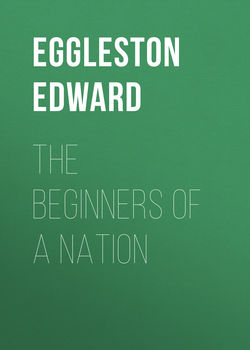Читать книгу The Beginners of a Nation - Eggleston Edward - Страница 25
BOOK I.
RISE OF THE FIRST ENGLISH COLONY
CHAPTER THE SECOND.
JAMES RIVER EXPERIMENTS
XV
ОглавлениеThe Great Charter, 1618. The movement of 1618 was retarded by the disgrace into which the colony had fallen. An unbroken series of misfortunes and disappointments, the bad conduct of the company's affairs, the ill fame of Dale's remorseless tyranny, and the fresh Argall scandal, had made Virginia odious. Pub. Rec. Off. Col. Papers, iii, 40. Disc. of the Old Va. Co. One convict to whom the alternative was proposed, chose hanging in preference to transportation to Virginia. It was needful that something should be done to restore credit. The men who took the lead in the patriotic movement of 1618 on behalf of Virginia were mainly liberal statesmen – that Earl of Southampton who is known as the friend of Shakespeare; Sir Edwin Sandys, one of the greatest men of a great age, whose brave support of popular liberty had lost him the favor of the king; Sir John Danvers, and others. The records before the election of Sandys in 1619 were probably destroyed to conceal the guilt of the managers. We can only conjecture that the rising influence of the men who were able a few months later to overthrow the ruling party had much to do with the most notable change that took place in the conduct of affairs in the Virginia Company at this time. On the 13th of November, 1618 – memorable but neglected and forgotten date – the Virginia Company, acting within the powers conferred on it by its charter, granted to the residents in Virginia a document styled a "Great Charter or Commissions of Priviledges, Orders, and Lawes." No copy of this instrument now exists, but some of its provisions have been preserved. It established a legislative body, to consist of councilors of estate and of representatives or burgesses chosen by the several "plantations" or hundreds, and it limited the power of the governor. This charter was the starting point of constitutional government in the New World. It contained in embryo the American system of an executive power lodged mainly in one person, and a Legislature of two houses. One might without much exaggeration call this paper a sort of Magna Charta of America, and it was a long and probably a deliberate step toward popular government. 22 If the results that have followed it be considered, it can hardly be accounted second in importance to any other state paper of the seventeenth century.
22
My attention was first attracted to the date of the Great Charter of November 13, 1618, by a minute in the handwriting of Secretary Williamson in the Public Record Office, as follows: "Those Adventurers & Planters by Vertue of ye sd Lettrs Patent of Incorporačon &c. made a Great charter of Lawes & Ordrs for ye govermnt of the Country. It bore date at London, Nov. 13th 1618." Col. Pprs, i, 11. The proceedings of the first Assembly in Virginia are preserved in the Public Record Office in Pory's Report. This report gives the only information we have regarding the provisions of this long-lost charter. An abstract of these proceedings is printed in the Calendar of Colonial Documents, and the whole document was reprinted in the New York Historical Society Collections, second series, vol. iii, and yet more carefully in the Colonial Records of Virginia, 1874. There is an allusion to this charter in the Briefe Relation, 1624. Various Virginia land grants deduce their authority from the Great Charter of Laws and Orders of November 13, 1618, as we learn from a note in the Aspinwall Papers, p. 14. There are many allusions to the charter of 1618 in the Manuscript Records of the Virginia Company in the Library of Congress.
